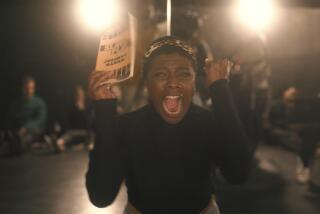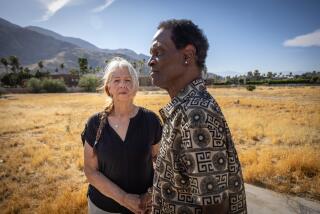THEATER : Echoes From the Streets : Playwright Dutch Parker speaks from experience in ‘Black Water Rising,’ a drama about indignity, prejudice and the law.
When Dutch Parker was in fifth grade, his teacher asked him if he was an alcoholic.
“Yeah,” he answered.
He was never out of trouble, born on the mean streets of Albany, N.Y., on the wrong side of the tracks. He says there wasn’t a day when he wasn’t in the precinct station for something. At 14, he held up a J. C. Penney store.
The memory of those precinct stations has never left him, the fear and the indignity, and the good-guy/bad-guy cops.
Sitting at rehearsals of his play, “Black Water Rising,” at Company of CharActors, he still breaks out in a sweat as he watches those moments in a police-station chair replayed, in the drama he has waited 25 years to write.
“I actually have flashbacks,” Parker says. “Is this live, or is this Memorex?”
The play is his way of working out the pain, but it’s not his story. Only the dialogue is real. His statement is about the evil of power in the wrong hands, about taking away another man’s dignity, not necessarily because he’s done something wrong.
When Parker sat down to write his play, just before the Los Angeles riots, he wanted to make his point as strongly as possible. “I wanted someone sitting in that chair who had suffered enough indignity as I did when I was a kid growing up. I didn’t grow up Puerto Rican and Mexican. I’m a Dutchman. Who could I put in that chair who will really suffer a lot of indignity, more than they’ve already suffered? I had a black kid in mind.”
“Black Water Rising” is set in a Southern sheriff’s office; the boy in question is brought in for a murder he claims he didn’t commit. Parker found the right ingredients for his battle between the evil of prejudice and the justice of understanding.
“This could be a Hispanic kid,” Parker insists, “or a Jewish kid in Nazi Germany. I put a black kid in that chair, but 65% of that kid is me .”
Parker has fought another battle, conquering the substance addiction that plagued him for so long. He was working all the while. He’s a published poet, and he moved into entertainment creating movie trailers for, among others, Warner Bros., and such films as “Hardcore.” He’s also a successful comedy writer, having worked with Marty Brill and Alan Thicke. But what he considers his big break came before all this.
“I had no electricity, no job, no water. I had nothing. Alcohol and drugs consumed my whole life. Then my wonderful wife picked me up out of the gutter four years ago.”
That’s when he went clean and started writing plays. His first play, “Dead Serious,” was produced for Company of CharActors. But it was time for him to get “Black Water Rising” out of his system.
It was also time for the director-actor Herb Mitchell to get serious on stage.
“We wanted a street play,” Mitchell says, “something that was very powerful, something that would utilize our energy.”
Mitchell, who directs “Black Water” and plays its unregenerately evil sheriff, was raised in Maine, and didn’t grow up around prejudice. He still cringes when he hears some of the play’s dialogue.
“I was never confronted with anything like that,” Mitchell says. “I have a very strong religious background, and I’m a strong believer in all men being created equal in God’s eyes.”
Mitchell, who usually plays nice guys and fathers on TV, has found that understanding his character is not easy.
“He’s very dangerous,” Mitchell admits with a shake of his head. “When he smiles, you’re in trouble. Unfortunately, there are a lot of people who are going to relate to this guy, because there are a lot of people walking around on two legs that really should be on four legs.”
Both Parker and Mitchell realize that the violent emotions and gut-wrenching dialogue in “Black Water Rising” may not be what some audiences want, but they believe the message has to be told. If it reaches a few, they’ve done their job.
The play is not just about a black kid in trouble, Parker says.
“It’s about a universal hatred. And it’s not lessening. It’s getting more and more and more. And it’s the education in the home. I’m not a bigot because I was not raised a bigot. Herb is not a bigot because he was not raised a bigot. But there are kids out there who are raised bigots.”
Where and When What: “Black Water Rising.” Location: Company of CharActors, 12655 Ventura Blvd., Studio City. Hours: 8 p.m. Thursdays through Saturdays, 5 p.m. Sundays, through Dec. 20. Price: $12. Call: (213) 466-1767.
More to Read
The biggest entertainment stories
Get our big stories about Hollywood, film, television, music, arts, culture and more right in your inbox as soon as they publish.
You may occasionally receive promotional content from the Los Angeles Times.










